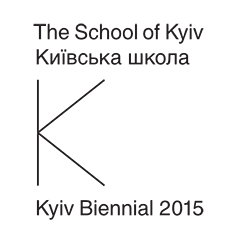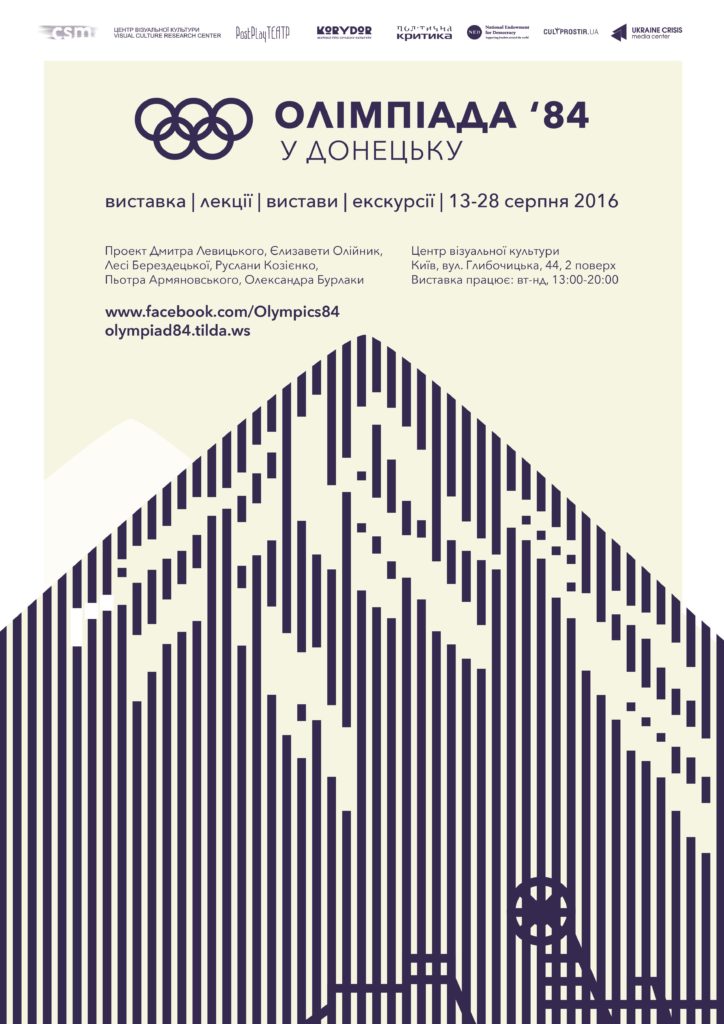“Olympiada-84 in Donetsk”: exhiition, lectures, plays, excurtions
August 13 – 28, 2016
Visual Culture Research Center and Political Critique invite you to the exhibition “Olympiada-84”, starting on Saturday, August 13 at 19:00 at the Visual Culture Research Center and will last until August 28.
During its history sport has never been “just sport”. Instead, it was some sort of a biopolitical “religion” of victory and records, closely intertwined with global economy and politics.
UEFA European Championship, the FIFA World Cup, the summer and winter Olympic Games were long ago turned into events that fundamentally change the infrastructure, landscape, and even the ecology of the cities they are held at. Countries and cities are ready to overspend their own resources just to have the right to host them.
At the same time, mass sports competitions have always been a powerful instrument for shaping collective identities: there is hardly anything that can create such feeling of emotional unity as rooting for “our guys” or, even more, against “the others”, especially during such collective rituals as ‚waves’ rolling through the stadium, or football chants.
All this together poses questions: could the Winter Olympic Games in 1984 have changed something, if they were held in Donetsk? Would have this improved the socio-economical development of the region? Could’ve it influenced the regional identity of Donbass, or would it become the reason for its inclusion to the “nationwide” identity? Finally, could’ve it changed anything in the context of the current war in Eastern Ukraine? Of course, history does not recognize the potential mood, and the imaginary space, fantasies, myths, fake memories, even games are usually regarded as accessory and casual. Putting above the “real historical facts”, we tend to not notice how events, which never became a part of the official history, can influence our present.
Without any doubt, the need to experience in 2016 the “never experienced” 1984 Olympics is symptomatic, and indicates the unconscious yearning for fixing “the mistakes of the past”. Hence the «Olympics-1984 in Donetsk» attempts to think them through working with personal stories of migrants from Eastern Ukraine — of those, whose identity is connected with the collective identity of Donbass. It seeks to understand why, to a certain extent, it was excluded from the “nationwide” identity through the pivotal political and social processes of the 80s on the way to the present political situation in Ukraine.
«Rosegarden» play
When and where: Saturday, 18 August, 2016, 20.00 at PostPlay Theatre (31, Nyzhnoiurkivska Str.)
Based on personal stories of three internally displaced migrants from the Donbass region, the idea of the play with their participation was to confront the official (documented) history, and the personal (oral) stories of certain people, discovering their essential incommensurability. In such context, stories about details, sensations, private rituals and feelings become in a way the opposition of the official history’s pathos, and the state machine producing it.
“Without Armour” play
When and where: Saturday, 27 August, 2016, 20.00 at PostPlay Theatre (31, Nyzhnoiurkivska Str.)
The performance is created upon a personal story and with the assistance of an ATO combatant. Its problematics can be outlined, perhaps, by his own commentary:
“We, the fighters, have a huge problem with self-identification. Who am I now? Am I a soldier or an ex-soldier? Am I the victor or the defeated? — It is not known. It’s impossible to give an unambiguous answer to any of these questions. Am I a military? — Yes, because I have served, and I will do it again, if needed. Am I a winner? — I definitely had a victory over myself. I obtained Ukraine within myself. I’m the winner in this particular aspect. But the society is looking at me with incomprehension: on the one hand, we waited for the victory from you so much, and you didn’t hand it. Or, maybe, on the other hand, I’m the defeated? — Who knows, I was broken and demoralized…”
Tours through M.M.Gryshko National Botanic Garden by Vitalii Kukhar
When and where: 14 and 28 of August, 14.00 at the Botanic Garden
Vitalii Kukhar, who is a migrant, works in the National Botanic Garden as a general labourer, but his main area of responsibility is the rosegarden. Vitalii spends most of his time in the garden, his days off are Saturday and Sunday. He is interested in the history of plants, their uses, the places these species were brought from. The garden becomes from time to time a place, where Vitalii meets his friends and acquaintances, including other migrants, to whom he tells his stories, which intertwine with the history of the garden.
Generation Games
When and where: Wednesday, 24 August 2016, 14.00 at the “Start” stadium
Not being exclusively restricted by the “adult history” of the 80s, the “Olympics-84” project aims to stage the games that were popular amongst children and teenagers of that time, engaging into the circle of experts the representatives of generations whose childhood was in the 70s and the 80s. We invite all children of 6 to 14 years old to participate in order to try out and assess the entertainment of the times of their parents’ childhood.
Lectures program:
Anton Liagusha, «The imaginary Donbass of the 1984 Olympics time: historical tropology, the Soviet feudalism and alienation.» When and where: Sunday, August 14, 19.00 at Visual Culture Research Center.
Kyrylo Tkachenko, «Enthusiasm and disappointment: Donbass miner’s movement from 1988 to 1993.» When and where: Friday, August 19, 19.00 at Visual Culture Research Center.
Danylo Sudyn, «Donetsk citizens’ identities — from Ukraine’s independence declaration to the occupation.» When and where: Saturday, August 20, 19.00 at Visual Culture Research Center.
Oleksii Karachynskyi, «Existential problems caused by the conditions of forced migration and military action.» When and where: Sunday, August 21, 19.00 at Visual Culture Research Center.
Anna Kravets. Visual laboratory. «Olympia: the festival of the cult of body and the Germany’s triumphal springboard on the eve of World War II,» and the screening of Leni Riefenstahl’s «Olympia. Festival of Nations» (1938). When and where: Thursday, August 25, 19.00 at Visual Culture Research Center.
Ruslana Kozienko, «Cultural trauma and the politics of memory: on the edge of the personal and the official.» When and where: Friday, August 26, 19.00 at Visual Culture Research Center.
Taras Liutyi, «Mass sports games and the power.» When and where: Sunday, August 28, 19.00 at Visual Culture Research Center.
Admission is free.
Authors of the project: «Olympics-84» Initiative (Dmytro Levytsky, Yelyzaveta Oliynyk, Piotr Armianovsky, Lesya Berezdetska, Ruslana Kozienko, Oleksandr Burlaka).
«Olympics-84» project is part of CSM / Foundation Center for Contemporary Art and Korydor online magazine «From the First Person: Memory. Voice. Dialogue» program, financed by National Endowment for Democracy (NED).
Автори проекту – ініціатива «Олімпіада-84» (Дмитро Левицький, Єлизавета Олійник, Пьотр Армяновський, Леся Берездецька, Козієнко Руслана, Олександр Бурлака).
Проект є частиною програми CSM / Фундації Центр Сучасного Мистецтва і онлайн-журналу Korydor «Від першої особи: Пам’ять. Голос. Діалог», профінансованої National Endowment for Democracy (NED).
Organizers: «Olympics-84» Initiative, Visual Culture Research Center
Partners: CSM / Foundation Center for Contemporary Art, Korydor magazine

![]()
National Endowment for Democracy (NED)
![]()
PostPlay Theat

Інформаційні партнери: Політична критика, Cultprostir.ua, Український кризовий медіа центр
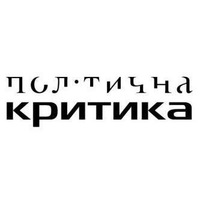
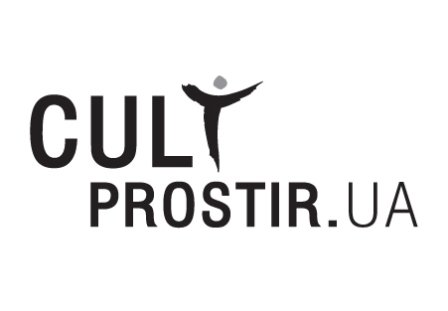
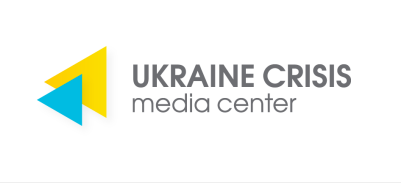
За підтримки ERSTE Stiftung та Charles Stewart Mott Foundation:
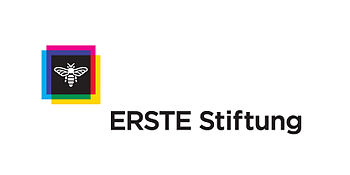
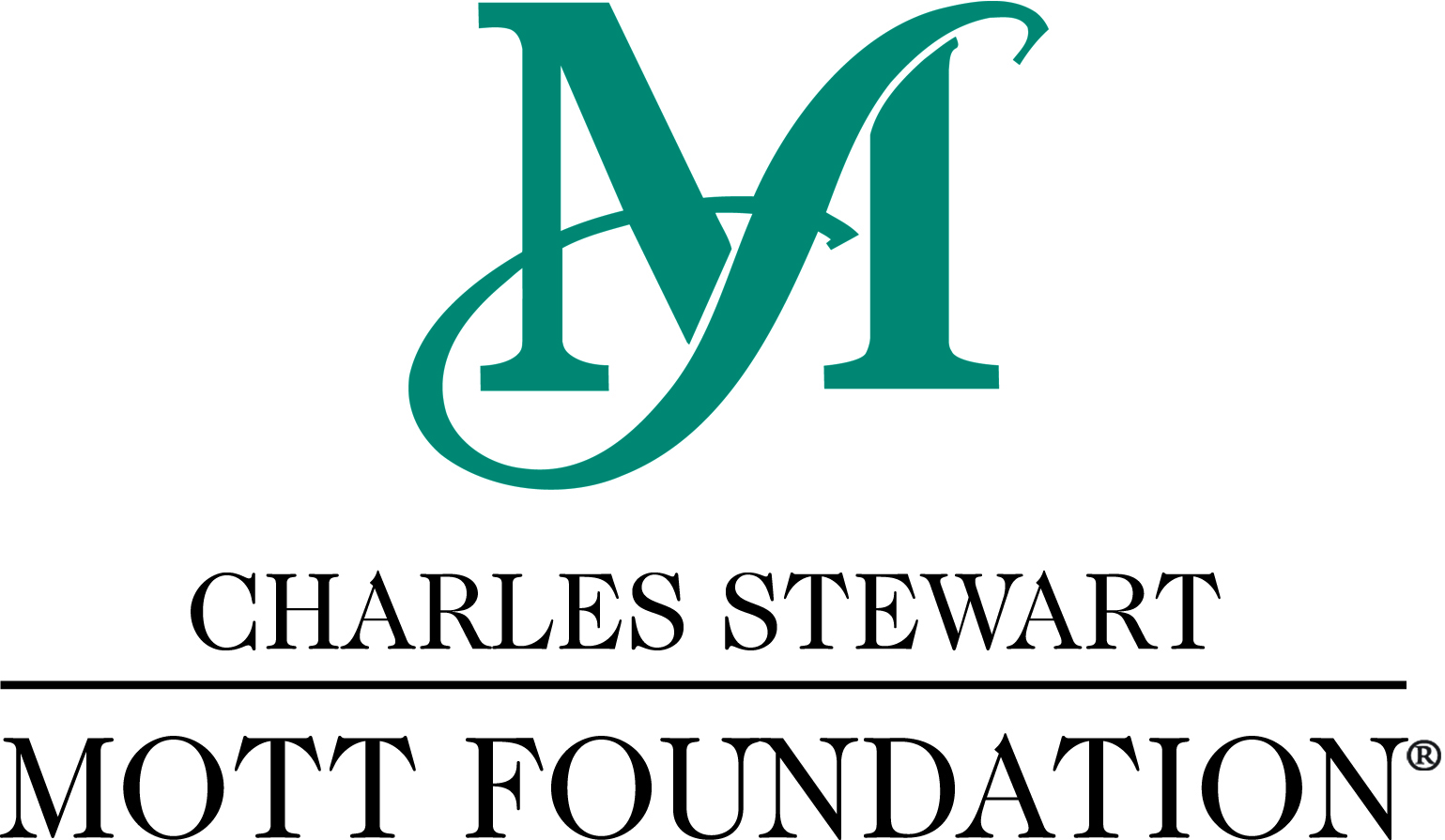
Контакти:
vcrc@vcrc.org.ua
www.facebook.com/vcrc.org.ua
www.facebook.com/Olympics84
+380639535143 Natalka Neshevets
+380676695457 Ganna Cyba
+380933911525 Ruslana Kozienko

